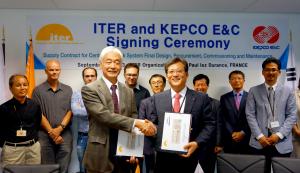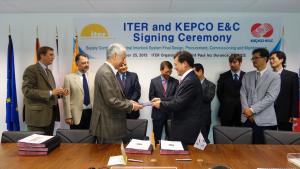Back-to-back contracts for KEPCO
On Wednesday 25 September, the ITER Organization signed two contracts with the Korean firm KEPCO E&C in back-to-back ceremonies that took place on the fifth floor of the ITER Headquarters.
The first contract covers the final design and procurement of the Central Interlock System, the ITER control system dedicated to machine protection. Together with CODAC and the Central Safety System, Central Interlock is the third of the three ITER Instrumentation and Control (I&C) central systems in charge of the correct and safe operation of the Tokamak.
A huge number of physical and functional interfaces will exist between the local control systems integrated into every component or plant and the three I&C systems. For Central Interlock, the R&D and prototyping phase was brought to a close last year with the successful preliminary design review that took place in December. KEPCO E&C and its consortium partners will now take over the detailed engineering design, procurement (hardware and software) and commissioning of the Central Interlock System up to First Plasma.
The participation of the National Fusion Research Institute (NFRI) in the KEPCO E&C consortium means that the ITER system will be tested in situ at the KSTAR Tokamak in Korea—a significant advantage for the evaluation and validation of the selected technologies.
The second document signed by ITER Director-General Osamu Motojima and Soon-Chul Yun, executive senior vice president of KEPCO E&C's Nuclear Division, was the Second Work Plan for Cable Engineering Support Services, which will run until May 2017.
This engineering framework contract signed in May 2012 provides engineering support for the design and routing of over 10,000 kilometres of cables throughout the ITER installation, the design of 200 km of cable trays and their seismic supports, and the production of cable tray manufacturing drawings and cable installation reports.
This Second Work Plan starts on 1 October 2013 and covers the build-to-print drawings for Tokamak Complex cable trays, including supports and most of the cable routing cards for the First Plasma. One KEPCO officer is permanently based out of ITER Headquarters to liaise between the ITER Electrical Engineering Division and the KEPCO team back in Seoul.



